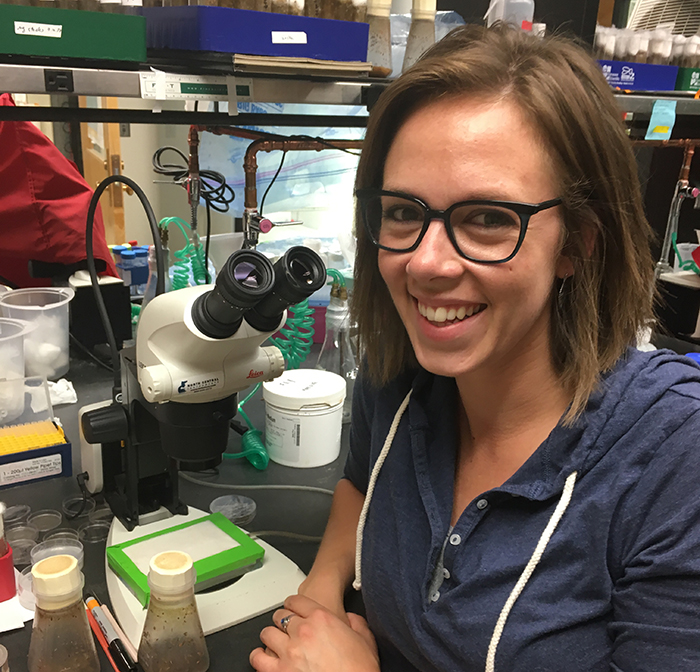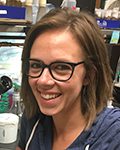We’re taking time over the following weeks to get to know the members of the GSA’s Early Career Scientist Committees. Join us every week to learn more about our early career scientist advocates.
Nicole Green
Career Development Subcommittee
Kansas State University
Research interest
One of the major challenges in developing new treatments for muscle diseases is an understanding of the genes and biological mechanisms central to tissue maintenance. In our lab, we use Drosophila melanogaster as a model to uncover novel genes involved in muscle development. My research focuses on the intersection of muscle development and innate immunity in Drosophila larvae. In a screen for novel muscle mutants, we isolated the gene fondue (fon), which is a secreted hemolymph protein previously characterized for its role in coagulation. Fon gets its name from its mutant clotting phenotype where clot fibers extend from a loss of ECM integrity. We found that Fon belongs to a set of secreted proteins that are made in distant immune tissues and recruited to sites of muscle attachment to form and maintain the ECM during development. More recently, we have been working to define the mechanism through which muscle tissue stress can activate innate immune signaling. Similar to patients with muscular dystrophies (MDs) and the mdx mouse model of MD, muscle detachment in fon mutants triggers an increase in immune-responsive gene expression and cellular immune responses. Understanding the mechanisms by which these two biological processes are intertwined will advance our knowledge of how tissue stresses can be sensed and elicit multi-tissue responses.
As a PhD-trained scientist, you have many career options. What career paths interest you the most?
I have always had an interest in bridging disciplines, whether through my scientific interests in genetics, cell biology, and physiology or a more broad integration of science and arts. I’m most interested in careers that incorporate science communication and education. Because of this, I have emphasized training in effective communication techniques, curriculum development, and teaching strategies. During my graduate career, I received an NSF GK-12 award that allowed me to implement new AP Biology modules incorporating my thesis research. I am in the process of publishing these lessons to extend these resources to other science educators. I also elected to continue as a teaching assistant for the majority of my graduate career for a range of majors outside my discipline, which taught me how to take complex material and tailor fundamental concepts beyond the K-12 classroom. By combining the long-standing use of Drosophila in learning environments and my communication skills, I hope to highlight the importance of genetic model organism research to students and the people in my community.
In addition to your research, how else do you want to advance the scientific enterprise?
We are doing science in a time where scientists and the public seem to be more and more disconnected while we simultaneously possess technology that enables us to tell our scientific stories to the whole world with the click of a button. I love using scientific images and storytelling to make research accessible to non-scientists and emphasize the ‘wow’ factor that inspires us all to do science day after day. In one minute, you can post an image of yourself working and share your success with your grandma. In one hour, you can invite students into your lab and spark the realization that they want to pursue a career in genetics. I believe it is a combination of demystifying us as scientists and putting our best efforts towards making our science relatable that will enable us to succeed in connecting our friends, family, and neighbors to the scientific research we love.
Through my experiences, I have found that a scientist looking for opportunities to engage with the public will have no problem finding inquisitive and enthusiastic audiences. This indicates that people are interested in science and want to learn more. Unfortunately, they don’t always have the opportunity to interact with scientists. I want to minimize the gap between scientists and the public by helping create university-community partnerships. I would encourage any scientist—regardless of their career goal—to engage people outside of the lab; it can be great for their professional development. Both my communication and research skills have been enhanced by my interactions with K-12 teachers, students of all ages, and the people in my community.
As a leader within the Genetics Society of America, what do you hope to accomplish?
As a member of the Career Development subcommittee, I am looking forward to meeting scientists around the world and broadening my professional network through the Decoding Life interview series. I really like that one of our main responsibilities is to learn about people’s journeys within science and to make this information accessible to other early career scientists. Many of our limitations as researchers come from not fully comprehending the full range of possibilities in front of us, which can make planning for life after graduate training stressful and uncertain. I am really excited about the emergence of resources about careers outside academia that open up new avenues for me and my peers. Using the unique paths of scientists who have successfully found careers they enjoy, I hope to be part of finding solutions to maximize early career scientist education and to successfully place scientists in positions within a competitive job market.
Previous leadership experience
- President, Biochemistry & Molecular Biophysics Graduate Student Association—Kansas State University
- Student Co-organizer, SciComm Week—Kansas State University
- Co-organizer—Real Observations Around Us (R.O.A.R.) Science Day
- Co-organizer, AP Biology Campus Research Visits—Kansas State University
Contact
































